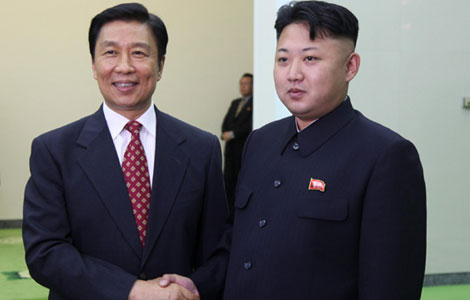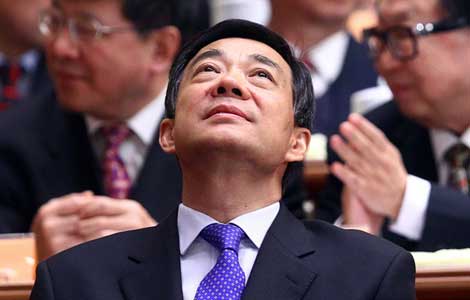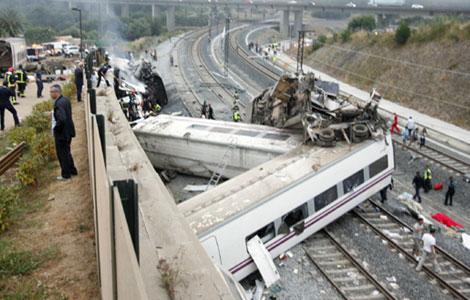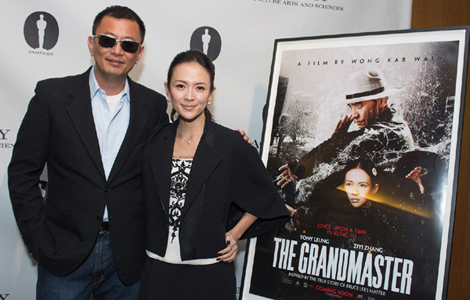Author explores 'China bashing'
Updated: 2013-07-26 12:12
By Zhang Yuwei in New York (China Daily)
|
||||||||
|
Lionel Vairon presents a different analysis of the China-bashing phenomenon in his new book. Hu Haidan / China Daily |
The debate over China's rise being a "threat" to many Western countries isn't a new topic, but a new book entitled China Threat? The Challenges, Myths and Realities of China's Rise presents some unique analysis for this ongoing discussion.
"The West has been controlling the world for quite a few hundred years, so it is difficult for them to accept the idea that China is joining the top leaders for the future," said author Lionel Vairon, an avid China watcher and a former French diplomat for 16 years.
Vairon describes China bashing, which especially spread to a larger degree during and after the 2008 Beijing Olympics when China was in the world spotlight, as a "campaign".
The "threat" perception of China's rise - typically linked to the country's mighty economic growth - mostly comes from the fact that it's hard for Western powers to adapt to the new reality, said Vairon.
For many Western pundits, the world's second-largest economy that had double-digit growth and has been one of the major drivers of global economic growth poses challenges and even a threat - rather than opportunities - to the already-existing West-dominated global system, said Vairon.
There also needs to be further understanding between China and the West, said Vairon, citing as an example the fact that of the 22 books written about China in France during the 2008 Olympics all were negative.
"In terms of marketing, it is much easier to be against and criticize China than try to have a balanced opinion," he added.
"I believe that having a new actor in the international society - which is not necessarily aligned with the European and American way of looking at the world - could be a plus," said Vairon.
China serves as "an important factor to have a more balanced international-relations system", he said.
The second-largest economy's rise has come a long way, along with constant criticism from the West at different levels - economic, military and political.
"It's a psychological problem that we believe we are always on the right side," said Vairon. "It doesn't mean that China is always on the right side, it just means that we have to always look at all the possibilities."
"We are always asking China to be what we are not, and I think that's sometimes a problem", said Vairon.
The US-China relationship has been defined as one of the most important ones in 21st century, yet misunderstandings and conflicts occur now and then.
Despite some progress by the US and China through recent events, such as the summit between Chinese President Xi Jinping and his counterpart Barack Obama, and the just-concluded US-China Strategic and Economic Dialogue, the two countries should work on "real moves", the French author believes.
"Both countries, I think, are mostly working on symbols, now in terms of reality - real moves - we have to see where it leads us," said Vairon.
yuweizhang@chinadailyusa.com
(China Daily USA 07/26/2013 page11)

 Top DPRK leader meets Chinese vice-president
Top DPRK leader meets Chinese vice-president
 US does not plan decision on Egypt coup
US does not plan decision on Egypt coup
 Bo Xilai indicted for corruption
Bo Xilai indicted for corruption
 Korean War veterans return to peninsula
Korean War veterans return to peninsula
 Tourist safety a priority in S China Sea
Tourist safety a priority in S China Sea
 Death toll in Spain train crash rises to 77
Death toll in Spain train crash rises to 77
 Royal baby named George Alexander Louis
Royal baby named George Alexander Louis
 'The Grandmaster' takes center stage
'The Grandmaster' takes center stage
Most Viewed
Editor's Picks

|

|

|

|

|

|
Today's Top News
Scholars provide a tour 'around the world'
GM says weakness in Asia leads to profit drop
Syrian rebels ask Kerry to send US arms quickly
Flights over sea 'routine training'
US does not plan decision on Egypt coup
Congress approves NSA spying program
Japanese PM unlikely to visit Yasukuni Shrine
Girl, 2, thrown to ground; suspect detained
US Weekly

|

|









